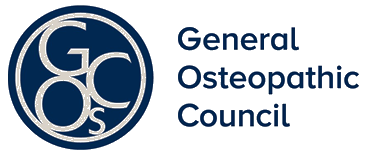
What is Osteopathy?
Osteopathy is a patient-centred system of healthcare which focuses primarily on the musculoskeletal system (the body’s muscles, joints, connective tissues, etc.).
It is a safe and effective hands-on therapy that uses tools such as stretching, manipulation of a person’s muscles and joints, and targeted deep tissue massage in order to treat a wide variety of symptoms and complaints.

Allied Health Professionals, recognised by the NHS
Osteopaths are highly competent Allied Health Professionals (AHPs), specialising in the diagnosis, treatment, management and prevention of musculo-skeletal and related disorders. They are recognised by the NHS as fully qualified to diagnose and treat complaints without the need for GP referral. They have studied the anatomy of the human body in great depth and combine this knowledge with a highly developed sense of touch, known as ‘palpation’, in order to detect when parts of the body are not functioning as they should be.

A holistic approach
Based on the principle that the way your body moves influences how it functions, osteopathy takes a holistic approach. By looking at the body as a whole, rather than simply assessing the painful area, osteopaths are able to determine not just ‘what’ is causing your symptoms, but ‘why’ this issue is affecting you (or why it keeps on coming back).
Of course osteopaths are well known for being able to provide quick and effective pain relief in a range of different circumstances, and for many people this is all that is needed. However, the ultimate aim of osteopathic treatment is to restore function and balance to the body in order to reduce the overall demand of your day-to-day activities and minimise the risk of injury developing. In order to achieve this, your osteopath will often need to discuss lifestyle changes with you; for example giving ergonomic advice, stretches, or strengthening exercises to run alongside your physical treatment.

Putting you at the centre
A core philosophy of osteopathic treatment is to prioritise you, the individual, over and above any named condition that you happen to be suffering from. This is what we mean by ‘patient-centred’. Clearly, it is useful to know the name of your complaint, and being primary health care practitioners, osteopaths are able to diagnose these conditions and give treatment and advice based on the current evidence. But it is important to remember that the same condition can often occur for many different reasons, and will affect people in very different ways. These differences depend on a combination of influences such as physical factors and lifestyle demands, which can vary hugely between individuals.
Just as every person’s body is unique, so is the nature of the complaint you are suffering from. Osteopaths recognise that a ‘one size fits all’ approach to treatment is not appropriate for many people and will aim to look holistically in order to identify the specific factors, unique to you, which are predisposing and maintaining your complaint. Based on these findings, your treatment plan will then be tailored to you individually, taking advantage of your body’s own natural healing mechanisms in order to return you to ‘your normal’ as quickly as possible.

Registered with the General Osteopathic Council
Osteopaths in the UK are required by law to register with the General Osteopathic Council. They spend a minimum of four years studying human anatomy, physiology, pathology and diagnosis, amongst other disciplines, before becoming eligible for registration.